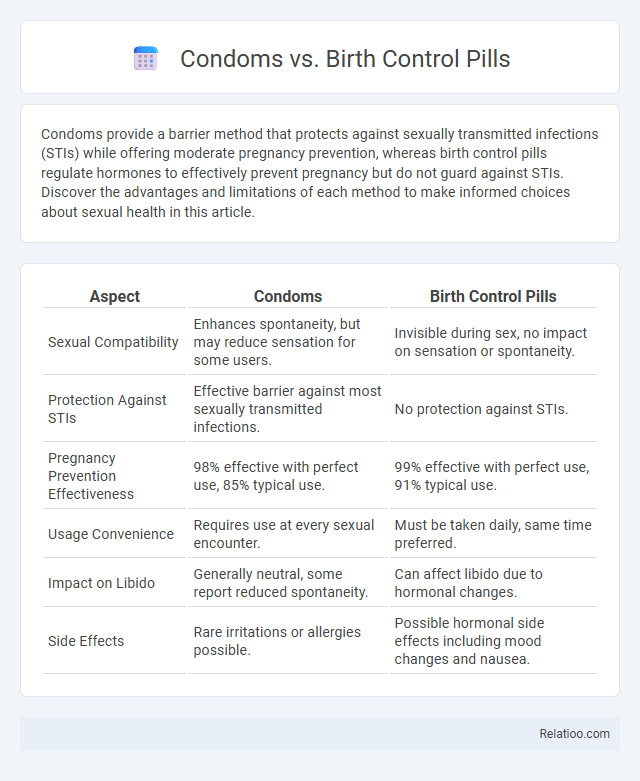Condoms provide a barrier method that protects against sexually transmitted infections (STIs) while offering moderate pregnancy prevention, whereas birth control pills regulate hormones to effectively prevent pregnancy but do not guard against STIs. Discover the advantages and limitations of each method to make informed choices about sexual health in this article.
Table of Comparison
| Aspect | Condoms | Birth Control Pills |
|---|---|---|
| Sexual Compatibility | Enhances spontaneity, but may reduce sensation for some users. | Invisible during sex, no impact on sensation or spontaneity. |
| Protection Against STIs | Effective barrier against most sexually transmitted infections. | No protection against STIs. |
| Pregnancy Prevention Effectiveness | 98% effective with perfect use, 85% typical use. | 99% effective with perfect use, 91% typical use. |
| Usage Convenience | Requires use at every sexual encounter. | Must be taken daily, same time preferred. |
| Impact on Libido | Generally neutral, some report reduced spontaneity. | Can affect libido due to hormonal changes. |
| Side Effects | Rare irritations or allergies possible. | Possible hormonal side effects including mood changes and nausea. |
Introduction to Contraceptive Options
Contraceptive options include condoms, birth control pills, and various other methods designed to prevent pregnancy effectively. Condoms provide a barrier method that also reduces the risk of sexually transmitted infections, while birth control pills regulate hormones to prevent ovulation. You can choose between these and other birth control options based on factors like convenience, protection level, and health considerations.
How Condoms Work: Barrier Protection Explained
Condoms provide effective birth control by acting as a physical barrier that prevents sperm from entering the uterus, reducing the risk of pregnancy and sexually transmitted infections. Unlike birth control pills, which regulate hormones to prevent ovulation, condoms offer immediate protection without requiring a prescription or daily routine. Your choice of contraception should consider how condoms uniquely block sperm at the source, offering dual protection for reproductive health.
Birth Control Pills: Hormonal Method Overview
Birth control pills are a hormonal method that use synthetic estrogen and progestin to prevent ovulation, making it highly effective in avoiding pregnancy. Your daily intake regulates hormone levels to thicken cervical mucus and thin the uterine lining, reducing the chances of sperm reaching an egg or fertilized egg implanting. Compared to condoms and other birth control methods, pills require consistent use but offer additional benefits like cycle regulation and reduced menstrual cramps.
Effectiveness: Condoms vs Birth Control Pills
Condoms have an effectiveness rate of about 85% with typical use, primarily due to user error or breakage, while birth control pills have a higher effectiveness rate of approximately 91% with typical use when taken consistently and correctly. Birth control pills offer hormonal regulation that prevents ovulation, providing more reliable pregnancy prevention compared to the physical barrier method of condoms. Combining both methods increases overall protection by preventing pregnancy and reducing the risk of sexually transmitted infections.
Protection Against Sexually Transmitted Infections
Condoms provide the most effective protection against sexually transmitted infections (STIs) by preventing direct contact and the exchange of bodily fluids during intercourse. Birth control pills primarily prevent pregnancy and do not offer any protection against STIs, leaving you vulnerable if used alone. For comprehensive sexual health, combining condoms with other birth control methods ensures both pregnancy prevention and significant STI protection.
Side Effects and Health Considerations
Condoms primarily cause mild side effects such as skin irritation or allergies due to latex, but they offer the added health benefit of protecting against sexually transmitted infections (STIs). Birth control pills may lead to side effects including nausea, weight changes, and increased risk of blood clots, requiring careful evaluation of cardiovascular health before use. Hormonal birth control methods also influence hormone levels, potentially impacting mood and menstrual cycles, making personalized medical consultation essential for safe administration.
Ease of Access and Usage
Condoms offer immediate, over-the-counter access without a prescription, making them highly convenient for spontaneous use. Birth control pills require a healthcare provider's prescription and daily intake at a consistent time, which may pose challenges in adherence. Your choice depends on how easily you can maintain regular routines or prefer on-demand protection.
Impact on Menstrual Regulation and Hormonal Balance
Birth control pills offer significant benefits for menstrual regulation by providing consistent hormone levels that reduce cycle irregularities and alleviate symptoms like cramps and heavy bleeding. Condoms, as a non-hormonal method, do not affect your menstrual cycle or hormonal balance, making them a suitable choice for those seeking hormone-free contraception. Other hormonal birth control methods also influence menstrual patterns, but their impact varies based on formulation and individual response.
User Responsibility and Compliance
Condoms require consistent and correct use during every sexual encounter, relying heavily on user responsibility to prevent pregnancy and sexually transmitted infections effectively. Birth control pills demand strict daily adherence to maximize contraceptive efficacy, with missed doses significantly increasing the risk of unintended pregnancy. Long-acting birth control methods, such as IUDs or implants, reduce user compliance issues by providing continuous protection without daily action, making them more reliable for individuals seeking low-maintenance contraception.
Choosing the Right Birth Control for Your Lifestyle
Choosing the right birth control depends on your lifestyle, health, and convenience preferences. Condoms provide protection against sexually transmitted infections and are useful for spontaneous encounters, while birth control pills offer a hormone-based method requiring daily adherence for effective pregnancy prevention. Understanding your routine and risk factors helps you decide between barrier methods like condoms, daily hormonal pills, or other birth control options tailored to your needs.

Infographic: Condoms vs Birth Control Pills
 relatioo.com
relatioo.com